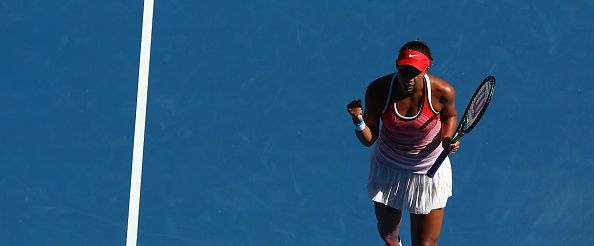Madison Keys made her first breakthrough on a major stage as a 19-year-old at last year’s Australian Open. She reached the semifinals, defeating Petra Kvitova and Venus Williams along the way. She has not been so consistent since then, though she always seems to bring her best at the Slams–which has earned her a Top 20 ranking and the No. 15 seed in Melbourne.
Still, her inconsistency in the second half of 2015 was very concerning and losing the first set of her second-round match to Yaroslava Shvedova was not a good sign. Maybe losing that set was something she needed, though, because after that point Keys was never troubled. Losing that first-set tiebreak seemed to help her focus. Her serve became much more potent and she only offered one more break point opportunity to her opponent in the final two sets.
An early loss here could have bumped Keys down about a dozen spots in the rankings. This win allows her to move forward in her 2016 with a little less pressure of the points she has to defend. Keys doesn’t necessarily need to reach the semifinals again in order to have a successful season, but a loss this early would have really increased the pressure on her the rest of the year. Interestingly enough, Keys also lost the first set of her second-round match (against Casey Dellacqua) at the Australian Open last year.
http://gty.im/505979282
On the men’s side, Andy Murray, Gael Monfils, Milos Raonic, and Stan Wawrinka all moved on in straight sets. Young American hopeful Jack Sock, on the other hand, was upset by Lukas Rosol, also in straight sets.
Fernando Verdasco–recently of Rafael Nadal-conquering fame–lost in the second round to Israeli Dudi Sela. Verdasco, pictured above, becomes the sixth consecutive player who defeated Nadal in a Slam match to lose his next match. (That number can be bumped up to eight if we count Steve Darcis, who did not even play his next match at 2013 Wimbledon due to an injury sustained against Nadal, and Stan Wawrinka, who defeated Nadal in the 2014 Australian Open final but lost his first match at the French Open that year.)
Verdasco has long been a talented player who has been unable to string together matches at his top level. This has led to some stunning losses. It is a little unfair to consider this one of them, though. He has clearly exhausted as the match went on in the afternoon heat and his opponent played one of the best matches of his career. Sela lacks any real power and relies on his finesse to win matches. His serve placement was much better than usual in this match and his backhand provided some highlight-reel winners. Most importantly, though, Sela played with tremendous depth on his routine and defensive shots, which did not allow Verdasco to hit the ball with as much power as he would have liked.
This will go down as another case of a Nadal conqueror losing his next match, or as just another case of Verdasco not backing up his big wins and losing in an unseemly upset. But what it should also be remembered as is a journeyman playing one of the best matches of his career to earn one of the best results in his career–in front of a raucous crowd of Israeli fans and expatriates, for whom tennis results worth cheering about are few and far between.







